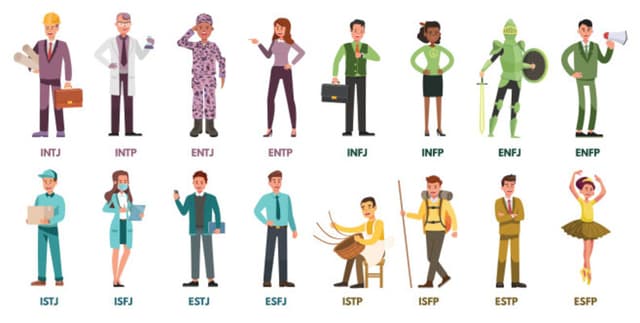Biometric and Personality Dataset
Data Science and Analytics
Tags and Keywords
Trusted By




"No reviews yet"
Free
About
This dataset explores the relationship between human posture and personality traits, specifically focusing on Myers-Briggs Type Indicator (MBTI) types [1]. It provides valuable insights for understanding the potential contribution of personality and posture to long-term pain management, particularly concerning occupational back pain, a prevalent disorder affecting the working population [1]. The study aims to determine the posture of individuals based on their MBTI type, offering data for the evaluation of the mind-body axis [1].
Columns
The dataset comprises 20 distinct columns [2], detailed as follows:
- S No: A serial number for each participant.
- AGE: The participant's age in years, ranging from 11 to 82, with a mean of 43.9 and standard deviation of 16.7 [3].
- HEIGHT: The participant's height in inches, with values from 58 to 74, a mean of 65.7, and a standard deviation of 3.72 [3, 4].
- WEIGHT: The participant's weight in pounds, ranging from 68 to 263, averaging 159 with a standard deviation of 36 [4, 5].
- SEX: The participant's gender, with 51% female and 49% male representation [5].
- ACTIVITY LEVEL: The participant's reported activity level, categorised as Low (76%), Moderate (18%), and Other (6%) [5].
- PAIN 1: Reports of pain in the neck, on a scale from 0 to 9.5, with a mean of 2.14 [5, 6].
- PAIN 2: Reports of pain in the thoracic region, on a scale from 0 to 10, with a mean of 3.75 [6, 7].
- PAIN 3: Reports of pain in the lumbar region, on a scale from 0 to 10, with a mean of 1.94 [7].
- PAIN 4: Reports of pain in the sacral region, on a scale from 0 to 10, with a mean of 2.53 [7, 8].
- MBTI: The Myers-Briggs personality type, with 15 unique types observed. ESFP (12%) and ESFJ (11%) are the most common [8].
- E: Extrovertism score, ranging from 2 to 21, with a mean of 12.7 [8, 9].
- I: Introvertism score, ranging from 0 to 19, with a mean of 8.29 [9].
- S: Sensing score, ranging from 5 to 25, with a mean of 15.1 [9, 10].
- N: Intuition score, ranging from 1 to 21, with a mean of 11 [10].
- T: Thinking score, ranging from 0 to 22, with a mean of 10.5 [10, 11].
- F: Feeling score, ranging from 2 to 24, with a mean of 13.4 [11, 12].
- J: Judging score, ranging from 0 to 20, with a mean of 10.3 [12].
- P: Perceiving score, ranging from 2 to 22, with a mean of 11.7 [12, 13].
- POSTURE: The assessed spine posture, with 4 unique types observed. Type B (37%) and Type A (23%) are the most common [13].
Distribution
The dataset is provided as a CSV file titled 'Myers Briggs Table_S1.csv' [2, 14]. It has a file size of 6.07 kB [2]. The dataset contains 97 records (rows) across all 20 columns, with no missing or mismatched values reported for any column [2-13].
Usage
This dataset is ideal for:
- Investigating the correlation between physical posture and personality traits [1].
- Developing models for multiclass classification of personality types or posture types [2].
- Research into the mind-body axis and its implications for health and well-being [1].
- Analysing factors contributing to long-term pain management, particularly occupational back pain [1].
- Exploring the impact of demographic factors (age, height, weight, sex, activity level) on posture and pain perception.
Coverage
The dataset includes demographic information such as age (11-82 years), height (58-74 inches), weight (68-263 pounds), and sex (51% female, 49% male) of participants [3-5]. It also captures activity levels and self-reported pain across various spinal regions [5-8]. The dataset encompasses 15 unique Myers-Briggs personality types and 4 unique spine posture types [8, 13]. Specific geographic or time range coverage is not provided in the source material.
License
CC0: Public Domain
Who Can Use It
This dataset is suitable for:
- Health researchers studying chronic pain and psychosomatic connections.
- Psychologists and behavioural scientists interested in personality's manifestation in physical traits.
- Data scientists and machine learning practitioners looking for a multiclass classification problem.
- Students and beginners in data analysis, given its 'Beginner' tag [2].
- Occupational health specialists investigating risk factors for back pain.
Dataset Name Suggestions
- Posture and Personality Correlation Study
- MBTI and Spinal Posture Dataset
- Mind-Body Pain and Personality Data
- Human Posture and Personality Traits
- Biometric and Personality Dataset
Attributes
Original Data Source: Biometric and Personality Dataset
Loading...
Free
Download Dataset in CSV Format
Recommended Datasets
Loading recommendations...
